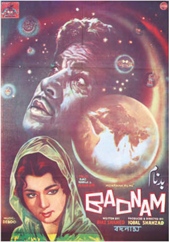fiction.wikisort.org - Movie
Badnaam is a Pakistani film in Urdu language, released on 2 September 1966, adapted from Saadat Hasan Manto's short story Jhumkay ("Ear-rings") by screenwriter Riaz Shahid.
| Badnaam | |
|---|---|
 | |
| بدنام | |
| Directed by | Iqbal Shehzad |
| Screenplay by | Riaz Shahid |
| Based on | Jhumkay by Saadat Hassan Manto |
| Produced by | Iqbal Shehzad |
| Starring |
|
| Cinematography | M. Sadiq |
| Music by | Deebo Bhattacharya |
| Distributed by | Montana Films |
Release date |
|
| Country | Pakistan |
| Language | Urdu |
The film was directed and produced by Iqbal Shehzad, in his debut as a film director. Badnaam's cast included Allauddin, Nabeela, Neelo, Ejaz Durrani, Diljeet Mirza, Hamid Wain, Rangeela and Zumurrud. The film celebrated its Silver Jubilee at the Pakistani cinemas in 1966 and was a box-office hit. The song of the film "Bare Bemurawat Hain Yei Husn Waale" was enormously popular, composed by Deebo Bhattacharya and is of the most prominent song of the singer Suraiya Multanikar. Badnaam received critical acclaim for its script and received three awards at Nigar Awards with a special award for Allauddin.[1]
Plot
The film's plot revolves around a poor housewife who desires to get a pair of earrings but her poor husband cannot afford it for her. One day, she buys them but pays a heavy price for it.
Cast
- Allauddin[1][2]
- Nabeela[1][2]
- Neelo[1][2]
- Ejaz Durrani[1][2]
- Diljeet Mirza
- Hamid Wain
- Rangeela[1]
- Zumurrud
Music
Music was composed by Deebo also known as Deebo Bhattacharya,[2] film song lyrics were by Masroor Anwar, Tanvir Naqvi and Himayat Ali Shair.[1][2]
- " Baday Be-Murrawwat Hain Yeh Husn Waalay, Kahin Dil Lagaanay Ki Koshish Na Karna"
- Sung by playback singer, Suraiya Multanikar. This mujra song was performed in the film by actress Zumurrud.[1]
- This run-away mega-hit film's "mujra" song was mainly responsible for the film's box-office success and became of the best known song of the singer. The tune of the song was also used by Indian music duo Nadeem-Shravan.[3]
- "Abhi Tau Dil Mein Halki Si Khalish Mahsoos Hoti Hai, Bahut Mumkin Hai Kal Iss Ka Mohabbat Naam Ho Jaaey"[1]
- Sung by Masood Rana
- "Bohat Beabroo Ho Kr Tere Kuche Se Hum Nikle"
- Sung by Masood Rana, Shaukat Ali, Salamat Ali, Imdad Hussain & co
- "Hum Bhi Musafir, Tum Bhi Musafir Kon Kisi Ka Howay"
- Sung by Masood Rana
- "Aa Tujh Ko Sunaun Lori, Halat Se Chori Chori"
- Sung by Naheed Niazi
Release and response
Badnaam was released on 2 September 1966. The film ran for 35 weeks in Karachi cinemas and was a silver jubilee hit.[1]
Reception
An author described it as "one of the best story-based films ever made in West Pakistan."[4] Due to its story, critics and film analysts credited it as "milestone for Pakistani cinema."[5][6]
Awards and Nominations
Nigar Awards
- Special Nigar Award - Allaudin[7]
- Nigar Award for Best Supporting Actress - Nabila
- Nigar Award for Best Scriptwriter - Riaz Shahid (based on a short story by Saadat Hasan Manto)[7]
References
- "Film Badnaam (1966)". Pakistan Film Magazine website. Archived from the original on 15 June 2017. Retrieved 28 June 2022.
- "Badnaam (1966 film)". Complete Index To World Film (CITWF) website. Archived from the original on 16 February 2020. Retrieved 28 June 2022.
- Amjad Parvez. "Deebo Bhattacharya — a captivating composer". Daily Times (newspaper). Retrieved 20 May 2022.
- Unesco (1971). The Performing Arts in Asia. ISBN 9789231009020.
- "Seven unforgettable, daring Pakistani films". Daily Times (newspaper). Archived from the original on 22 January 2022.
- "Badnaam on Illustrated Weekly of Pakistan". October 1967. Retrieved 28 June 2022.
- "Nigar Awards - 1966". Cineplot.com website. Archived from the original on 10 October 2011. Retrieved 28 June 2022.
Другой контент может иметь иную лицензию. Перед использованием материалов сайта WikiSort.org внимательно изучите правила лицензирования конкретных элементов наполнения сайта.
WikiSort.org - проект по пересортировке и дополнению контента Википедии